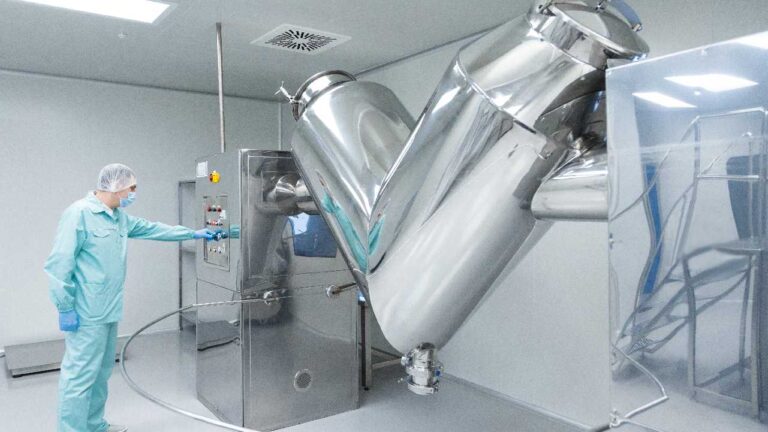
Companies often rely on external partners to help bring their products to market efficiently and effectively. Among these partners are Contract Development and Manufacturing Organisations (CDMOs), Contract Manufacturing Organisations (CMOs), and Contract Research Organisations (CROs).
While these entities may sound similar, they serve distinct roles in the pharmaceutical ecosystem. In this article, we’ll look into the key differences between CDMOs, CMOs, and CROs, exploring their functions, services, and contributions to the industry.
Introduction to CDMOs
Contract Development and Manufacturing Organisations, or CDMOs, are vital players in the pharmaceutical supply chain. Their involvement spans the entire lifecycle of a pharmaceutical product, from conception to commercialisation.
Unlike other contract organisations, CDMOs offer a holistic approach, seamlessly integrating development and manufacturing processes to streamline drug production.
Services Offered by CDMOs
CDMOs provide an extensive range of services tailored to the specific needs of pharmaceutical companies:
- Formulation Development: CDMOs collaborate closely with pharmaceutical firms to develop formulations for drug substances. Through research and testing, they optimise the composition of these substances for maximum efficacy, stability, and manufacturability.
- Process Development: Using cutting-edge technologies and industry best practices, CDMOs design and refine manufacturing processes. Their goal is to enhance efficiency, scalability, and compliance with stringent regulatory standards.
- Analytical Testing: CDMOs conduct rigorous testing to evaluate the quality, purity, and stability of drug substances. Utilising advanced analytical techniques and state-of-the-art equipment, they ensure that products meet rigorous quality control standards.
- Scale-Up Production: Once a formulation is finalised, CDMOs seamlessly transition to large-scale production. Using their expertise and robust infrastructure, they scale up manufacturing operations to meet commercial demand while maintaining consistent quality and supply.
- Regulatory Compliance: Dealing with the complex landscape of regulatory requirements is a core competency of CDMOs. They ensure that products adhere to all applicable standards, certifications, and regulatory filings, facilitating smooth regulatory approvals and market entry.
- Packaging and Labelling: CDMOs provide packaging and labelling services thereby ensuring that finished products are securely packaged and accurately labelled in compliance with regulatory standards.
- Quality Assurance: Quality control is an essential part of CDMO operations Throughout the manufacturing process. CDMOs implement strong quality control measures to maintain product integrity and consistency, delivering products of exceptional quality to their clients.
Benefits of Partnering with CDMOs
Collaborating with CDMOs offers numerous advantages for pharmaceutical companies:
- Comprehensive Expertise: CDMOs have specialised expertise in both development and manufacturing domains. By offering a one-stop solution, they simplify the pharmaceutical development process, from concept to commercialisation.
- Cost Efficiency: Outsourcing to CDMOs can lead to significant cost savings. By eliminating the need for substantial investments in infrastructure and overhead expenses associated with in-house operations, pharmaceutical companies can allocate resources more efficiently.
- Faster Time-to-Market: The simplified processes and accelerated timelines offered by CDMOs enable pharmaceutical companies to bring products to market more rapidly. This faster time-to-market provides a competitive edge and allows companies to capitalise on emerging opportunities.
- Flexibility and Scalability: CDMOs offer flexibility in production volume and scale. Their agile manufacturing capabilities enable companies to adapt quickly to fluctuating market demands without incurring significant capital expenditures or disruptions to operations.
What are CMOs?
In the pharmaceutical world, Contract Manufacturing Organisations are also players specialising in the manufacturing of drug substances and final products just like CDMOs, however, their actual role is restricted when compared to CDMOs. Unlike Contract Development and Manufacturing Organisations, which provide a full suite of services, CMOs concentrate solely on the manufacturing segment of the pharmaceutical supply chain.
Services Offered by CMOs
CMOs extend several manufacturing services which are meant only to serve the requirements of pharmaceutical companies:
- Primary Manufacturing: At the core of CMO operations lies the synthesis of active ingredients and raw materials to produce drug substances. CMOs carefully adhere to stringent quality standards and regulatory mandates throughout this important process.
- Secondary Manufacturing: Following primary manufacturing, CMOs mainly excel in formulating drug substances into final dosage forms, including tablets, capsules, and injectables. These products are meticulously crafted to be ready for distribution and commercialisation.
- Packaging and Labelling: CMOs, just like CDMOs provide packaging and labelling services to comply with regulations and standards of the pharmaceutical industry.
- Quality Assurance: CMO operations also focus on quality control just like CDMOs, although on a lower scale. CMOs also try to deliver good quality products to their clients similar to CDMOs.
Benefits of Partnering with CMOs
Partnering with CMOs presents pharmaceutical companies with some advantages:
- Specialised Manufacturing Expertise: CMOs have advanced manufacturing technologies and processes honed through years of experience. This specialised expertise ensures efficient and high-quality production, meeting the exacting standards of the pharmaceutical industry.
- Cost Savings: Outsourcing manufacturing to CMOs offers pharmaceutical companies cost savings. By eliminating the need for in-house production facilities and associated capital expenditures, companies can redirect resources to core competencies such as research, development, and commercialisation.
- Scalability: One of the key advantages of partnering with CMOs is their ability to offer scalable manufacturing solutions, though on a lower scale when compared to CDMOs. CMOs can adjust production volumes dynamically to align with market demand, ensuring flexibility without compromising on quality or efficiency.
- Focus on Core Competencies: By entrusting manufacturing to CMOs, pharmaceutical companies can focus on their core competencies. This includes research, development, and commercialisation efforts, fostering innovation and driving growth within the organisation.
What are CROs?
Contract Research Organisations, known as CROs, are vital players in the pharmaceutical, biotechnology, and medical device sectors. Their specialisation lies in managing clinical trials and conducting research to support the development and validation of pharmaceutical products.
Although CROs do not engage directly in manufacturing processes, their contributions are indispensable in bringing new drugs to market.
Services Offered by CROs
CROs offer several services to facilitate clinical trial management and research:
- Clinical Trial Management: CROs undertake the planning, execution, and monitoring of clinical trials. They ensure that these trials adhere to rigorous regulatory standards and ethical guidelines, overseeing every aspect of the process to maintain integrity and compliance.
- Protocol Development: Collaborating closely with pharmaceutical companies, CROs develop and refine clinical trial protocols. These protocols delineate the study’s objectives, methodologies, and endpoints, providing a blueprint for conducting the trial effectively and ethically.
- Data Management: CROs are responsible for collecting, analysing, and reporting data generated during clinical trials. This involves meticulous data collection, robust analysis methodologies, and comprehensive reporting to provide insights into the safety and efficacy of investigational drugs.
- Regulatory Compliance: Dealing with the complex landscape of regulatory requirements, CROs facilitate the approval process for clinical trials. They liaise with regulatory agencies and ethics committees to obtain necessary approvals and ensure that trials are conducted by applicable regulations.
Benefits of Partnering with CROs
Collaborating with CROs has numerous benefits for pharmaceutical companies:
- Expertise in Clinical Research: CROs possess specialised expertise in clinical trial design, execution, and regulatory compliance. Their proficiency reduces risks and enhances the likelihood of study success, providing valuable support throughout the drug development process.
- Efficiency and Speed: Outsourcing clinical trials to CROs can expedite the drug development timeline, leading to faster time-to-market and revenue generation. CROs streamline processes, optimise resource utilisation, and implement best practices to accelerate the pace of clinical research.
- Cost-Effectiveness: CROs offer cost-effective solutions for clinical trial management, enabling pharmaceutical companies to optimise resource allocation and maximise budget efficiency. By outsourcing to CROs, companies can minimise overhead costs associated with in-house trial management.
- Global Reach: Operating on a global scale, CROs facilitate access to diverse patient populations and enable the conduct of multi-centre trials. This global reach enhances the generalisability of study results, enriching the scientific understanding of drug efficacy and safety across different demographics and geographic regions.
Why Do Companies Outsource These Services?
Outsourcing services to Contract Development and Manufacturing Organisations (CDMOs), Contract Manufacturing Organisations (CMOs), and Contract Research Organisations (CROs) has become a common practice in the pharmaceutical industry.
Companies outsource services to CDMOs, CMOs, and CROs for various reasons, including cost efficiency, access to specialised expertise, flexibility and scalability, focus on core competencies, and risk mitigation.
Several factors contribute to the decision of companies to engage external partners for various aspects of their drug development and manufacturing processes.
1. Cost Efficiency
One of the primary reasons companies outsource these services is to achieve cost savings. Building and maintaining in-house capabilities for research, development, and manufacturing can be expensive.
By outsourcing to specialised service providers, companies can avoid the high costs associated with infrastructure, equipment, and personnel. Additionally, outsourcing allows companies to benefit from economies of scale offered by CDMOs, CMOs, and CROs, leading to overall cost reductions.
2. Access to Specialised Expertise
Pharmaceutical development and manufacturing require specialised knowledge and expertise across various disciplines, including chemistry, biology, engineering, and regulatory affairs. CDMOs, CMOs, and CROs employ highly skilled professionals with expertise in these areas.
By outsourcing to these organisations, companies gain access to a diverse pool of talent and experience, enabling them to leverage specialised skills that may not be available in-house. This access to expertise can enhance the quality of research, development, and manufacturing processes, ultimately leading to better outcomes for the company.
3. Flexibility and Scalability
Outsourcing services to external partners provides companies with flexibility and scalability to adapt to changing market conditions and business needs. CDMOs, CMOs, and CROs offer flexible engagement models that allow companies to scale their operations up or down as needed.
This flexibility is particularly valuable in the dynamic pharmaceutical industry, where market demand, regulatory requirements, and technology advancements can change rapidly.
By outsourcing, companies can mitigate risks associated with fixed investments in infrastructure and personnel, allowing them to respond more effectively to market opportunities and challenges.
4. Focus on Core Competencies
Outsourcing non-core activities to specialised service providers allows companies to focus their resources and attention on their core competencies. For pharmaceutical companies, this often means focusing on research, development, and commercialisation efforts, while leaving manufacturing, clinical trial management, and other support functions to external partners.
By concentrating on their core strengths, companies can improve efficiency, innovation, and competitiveness, ultimately driving growth and success in the market.
5. Risk Mitigation:
Outsourcing can help companies mitigate risks associated with drug development and manufacturing. By partnering with experienced CDMOs, CMOs, and CROs, companies can leverage their partners’ expertise, infrastructure, and quality systems to reduce the likelihood of errors, delays, and compliance issues.
Additionally, outsourcing allows companies to share risks with their partners, spreading the financial and operational risks associated with drug development and manufacturing across multiple parties.
This risk-sharing arrangement can provide companies with greater confidence and stability in their operations, ultimately enhancing their ability to deliver safe and effective products to market.
By utilising the capabilities of external partners, companies can optimise their operations, accelerate product development, and bring innovative treatments to market more efficiently, ultimately improving patient outcomes and advancing public health.
Final Words
Contract Development and Manufacturing Organisations, Contract Manufacturing Organisations, and Contract Research Organisations serve distinct yet complementary roles in the pharmaceutical industry.
While CDMOs offer end-to-end solutions including both development and manufacturing, CMOs only specialise in manufacturing, and CROs focus on clinical trial management and research.
Through a clear understanding of the differences between these entities and leveraging their respective expertise, pharmaceutical companies can optimise their operations, accelerate product development, and bring innovative treatments to market more efficiently, ultimately improving patient outcomes and advancing public health.







